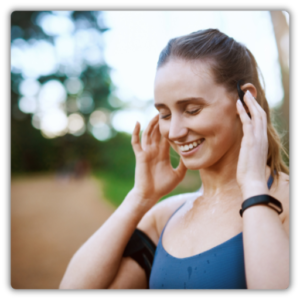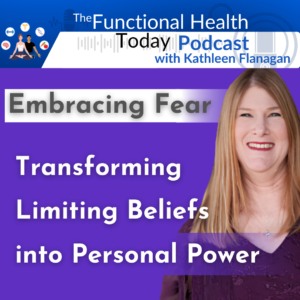What are the benefits of binaural beats?
 Binaural beats are created by playing two slightly different tones in each ear, producing an auditory illusion the brain perceives as a third tone. For example, a 10 Hz beat can promote relaxation, while a 40 Hz beat may boost focus.
Binaural beats are created by playing two slightly different tones in each ear, producing an auditory illusion the brain perceives as a third tone. For example, a 10 Hz beat can promote relaxation, while a 40 Hz beat may boost focus.
Research suggests binaural beats help reduce stress and anxiety, with delta beats (around 4 Hz) promoting deep sleep and theta beats (4-8 Hz) enhancing creativity and intuition. By leveraging the brain’s natural ability to sync with these frequencies, binaural beats support relaxation, focus, and mental clarity.
KEY POINTS
Binaural beats use two slightly different frequencies to synchronize brainwaves, helping to promote relaxation, focus, and creativity depending on the chosen frequency.
Research suggests delta waves (1–4 Hz) enhance deep sleep, while theta waves (4–8 Hz) boost intuition and creativity, making binaural beats a versatile tool for wellness.
Listening to specific frequencies can help alleviate stress and anxiety, with gamma waves (30–40 Hz) enhancing focus and mental clarity for productivity.
Incorporating binaural beats into activities like meditation or yoga can deepen relaxation and improve emotional regulation, supporting overall mental well-being.

Pop in your email below, and we’ll zip it straight to your inbox so you never lose it!
How do binaural beats work in the brain?
Binaural beats may induce a calming effect by presenting two different tones to each ear. For example, a tone of 300 Hz in the left ear and 290 Hz in the right ear creates a binaural beat of 10 Hz, which the brain perceives as a single sound. This difference between the two frequencies can influence brain activity.
When listening to binaural beats in the frequency range of 30 hz, studies on the effects suggest enhanced focus and relaxation, making them popular in the world on youtube for meditation and relaxation. Binaural beats are said to help alleviate anxiety or stress, especially when combined with traditional mindfulness techniques.
In a controlled study examining binaural beat audio, researchers found that participants experienced significant changes in their brainwave patterns. In addition, some studies have produced original compositions created and produced specifically for binaural beats in addition to traditional soundscapes.
These beats in addition to traditional music can help listeners find a deeper state of relaxation by engaging different brain regions. Ultimately, the experience of binaural beats varies depending on the individual’s perception of the difference between the two tones.
If you want to learn more about how binaural beats work and their potential benefits, check out this comprehensive guide on binaural beats from WebMD.
What are the different types of brain waves affected by binaural beats?
 Different types of brain waves are affected by binaural beats, which are created when two tones of slightly different frequencies are played in one ear and a second ear. For example, a 6-hz binaural beat can help induce a theta frequency, promoting relaxation and creativity.
Different types of brain waves are affected by binaural beats, which are created when two tones of slightly different frequencies are played in one ear and a second ear. For example, a 6-hz binaural beat can help induce a theta frequency, promoting relaxation and creativity.
Research has found that binaural beats shown to reduce stress and anxiety levels in patients undergoing general anesthesia. In addition to traditional therapy, anxiety symptoms can be alleviated by using these auditory stimuli, which affects on general theta rhythm and can help patients undergoing treatment.
Studies have compared the effects on general theta rhythm and levels of anxiety in patients, indicating that whether binaural beats are effective depends on the certain frequency used. Overall, input from both ears is essential to experience the therapeutic benefits of binaural beats.
How to use binaural beats effectively?
What frequency should I listen to for relaxation?
For relaxation, listening to binaural beats in the delta frequency range, typically around 1-4 Hz, can be beneficial. Binaural beat therapy aims to reduce anxiety and promote calmness through entrainment, where the brain synchronizes to the frequencies of the two beats.
A pilot study to assess the effectiveness of binaural beats found that binaural beats in the delta range significantly lowered anxiety in patients undergoing general anaesthesia for day surgeries. In contrast, gamma frequencies can increase focus, making it essential to choose the right beats to find your desired mental state.
How to incorporate binaural beats into your daily routine?
To incorporate binaural beats into your daily routine, start by setting aside time for focused listening. Use of binaural beats can effectively entrain your brainwaves to specific frequencies, such as the alpha state at around 10 hertz, promoting relaxation and mental clarity.
Consider pairing the use of binaural beats with activities like meditation or yoga. Studies indicate that binaural beats can enhance EEG power and emotional regulation, particularly when targeting the theta rhythm and frontal midline areas of the brain. Always follow strict sourcing guidelines and relies on peer-reviewed research for the best results.
What is the effect of binaural beats on sleep?
Which binaural beat frequencies are best for sleep?
 To aid sleep, specific binaural beats to entrain the brain’s natural rhythms are beneficial. Frequencies around 4-8 Hz, often called a binaural beat, facilitate relaxation and sleep onset. Research compared these beats with general theta rhythm and frontal midline theta, revealing their effectiveness.
To aid sleep, specific binaural beats to entrain the brain’s natural rhythms are beneficial. Frequencies around 4-8 Hz, often called a binaural beat, facilitate relaxation and sleep onset. Research compared these beats with general theta rhythm and frontal midline theta, revealing their effectiveness.
However, the quality of the available studies relies on peer-reviewed studies, indicating that some might show a failure to enhance EEG power. Notably, anaesthesia for day case surgery studies assess heart rate and skin conductance, linking these parameters to sleep quality.
Can binaural beats improve sleep quality?
Research suggests that binaural beats may enhance sleep quality by promoting delta brain waves, which are essential for deep sleep. When beats compared to traditional relaxation techniques, binaural beats could offer a unique auditory experience. This approach is particularly intriguing for individuals undergoing general anaesthesia for day case procedures, as effective sleep is crucial for recovery.
If you want to experience the power of binaural beats firsthand, try this 3.2Hz Delta Brain Waves sleep music designed for deep healing and REM sleep.










